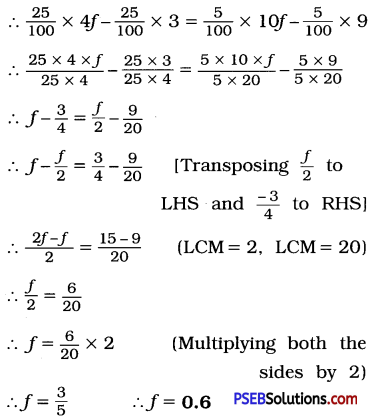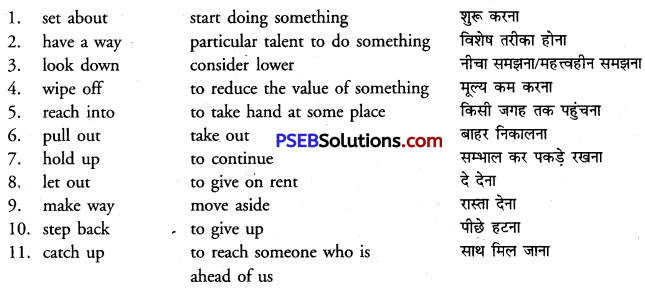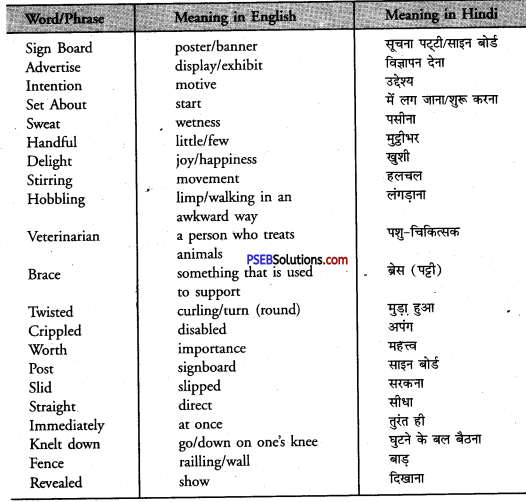Punjab State Board PSEB 8th Class English Book Solutions Chapter 7 Safety While Driving Textbook Exercise Questions and Answers.
PSEB Solutions for Class 8 English Chapter 7 Safety While Driving
Activity 1
Look up the following words in a dictionary. You should seek the following information about the words and put them in your WORDS notebook.
1. Meaning of the word as used in the lesson (adjective/noun/verb. etc.)
2. Pronunciation (The teacher may refer to the dictionary or a mobile phone for correct pronunciation.)
3. Spellings.
| mischief |
itinerary |
sneak |
reverse |
mechanism |
| confidence |
impound |
counsel |
blunder |
reflexes |

Vocabulary Expansion
Activity 2
Look at the grid. Encircle the words taken from the chapter which mean the following. The first one is done for you.
1. a person who walks on the road
2. alert and careful
3. when two vehicles get hit
4. to take into custody of the law
5. mistake
6. to turn in an opposite direction
7. eager and enthusiastic
8. the effect, result or outcome of something
9. advice ; opinion or instruction given
10. a person under the age of 18 in India.
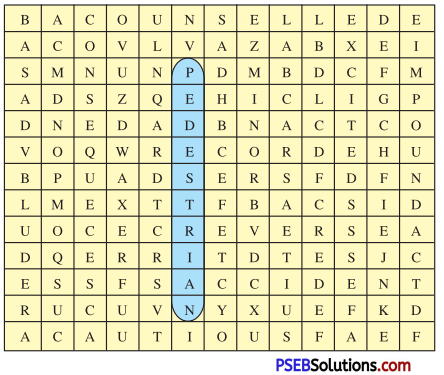
Activity 3.
Match the words given in the table with their antonyms. Write the number of the word in the column given on the right hand side. The first one is done for you.
| S. No. |
Word |
Antonym |
Number |
| 1. |
above |
never |
9 |
| 2. |
absent |
after |
8 |
| 3. |
accept |
alive |
12 |
| 4. |
advantage |
depart |
7 |
| 5. |
before |
cruel |
2 |
| 6. |
for |
light |
13 |
| 7. |
agree |
disadvantage |
10 |
| 8. |
dead |
present |
3 |
| 9. |
always |
below |
1 |
| 10. |
question |
disagree |
11 |
| 11. |
appear |
answer |
20 |
| 12. |
arrive |
decline |
4 |
| 13. |
kind |
against |
5 |
| 14. |
M |
careless |
19 |
| 15. |
front |
ugly |
16 |
| 16. |
beautiful |
back |
15 |
| 17. |
below |
above |
17 |
| 18. |
heavy |
sharp |
6 |
| 19. |
blunt |
empty |
18 |
| 20. |
careful |
disappear |
14 |
Answer:
1. above – below
2. absent – present
3. accept – decline
4. advantage – disadvantage
5. before – after
6. for – against
7. agree – disagree
8. dead – alive
9. always – never
10. question – answer
11. appear – disappear
12. arrive – depart
13. kind – cruel
14. full – empty
15. front – back
16. beautiful – ugly
17. below – above
18. heavy – light
19. blunt – sharp
20. careful – careless.

Learning to Read and Comprehend
Activity 4
Answer the following questions.
Question 1.
What does Seema love ?
सीम्त को क्या पसंद है ?
Answer:
Seema loves automobiles.
Question 2.
What does she read on the Internet ?
वह इंटरनेट पर क्या पढ़ती है ?
Answer:
She reads a lot about cars and their mechanism on the Internet.
Question 3.
Why did she call her friend Bhavya ?
उसने अपनी मित्र भावया को क्यों बुलाया ?
Answer:
She called Bhavya because she knew a lot about driving.
Question 4.
What did Seema and Bhavya decide ?
सीमा और भावया ने क्या निश्चय किया ?
Answer:
They decided to drive the car.

Question 5.
What was their itinerary?
उनकी यात्रा योजना क्या थी ?
Answer:
They planned to go to Sector-17.
Question 6.
Who did they meet at the end of the road ?
सड़क के अन्त में उन्हें कौन मिला ?
Answer:
They met the two traffic policemen at the end of the road.
Question 7.
What did the police do?
पुलिस ने क्या किया ?
Answer:
The police impounded the car and took them to the police station for writing the report.
Question 8.
How did the police counsel Seema and Bhavya ?
पुलिस ने सीमा और भावया को कैसे सलाह (समझाया) दी ?
Answer:
They advised them not to go for driving until they are 18. Otherwise, they may involve in serious accident. Driving for a minor is illegal too.
Question 9.
What did Seema and Bhavya decide after the counselling ?
सलाह के बाद सीमा और भावया ने क्या निर्णय लिया ?
Answer:
After the counselling they decided that they would never repeat such blunder.
Activity 5
Discuss (Groupwork)
A. What mistake did the two girls commit? Had the police not caught them near their home, what could have happened to them ?
B. What are the two most important traffic rules that we all should follow ? Why do you think it is important to follow traffic rules?
C. Why is it important for everyone on the road to be patient ?
Answer:
(A) The two girls were minor, still they planned to drive on the busy road. Had the police not caught them they might have done a very serious accident.

(B)
- We should follow the traffic lights.
- We should follow the traffic signals. Traffic rules are for the road safety so we must follow them.
(C) It is important to be patient on the road because impatience causes accidents and quarrels.
Learning Language
Active and Passive Voice Voice is the form of a verb that shows its connection with the subject. It is of two kinds:
- Active Voice
- Passive Voice
Active Voice : When the verb shows that the subject does something, it is said to be in the Active Voice.
Passive Voice : Passive Voice shows that something is done to the subject.
Example :
Ram eats an apple. (Active Voice)
An apple is eaten by Ram. (Passive Voice)
Need for changing from Active to Passive Voice :
Passive voice is generally used in the following cases :
1. Where the subject is obvious, for example :
(a) The letters were delivered. (by the postman).
(b) My tooth was extracted this morning only. (by the dentist)
(In these examples, the subjects in the active voice ‘the postman’ and ‘the dentist need not be mentioned as it is obvious who the doer is.)
2. Where the subject is not known, for example :
(a) My pen was stolen. (by someone)
(b) The window pane was broken. (by someone)
(In these examples, the identity of the subject in the active voice is not known.)
3. Where the identity of the subject is not meant to be revealed, for example
(a) Ratan was dismissed from his job. (passive)
[The boss/the management dismissed Ratan from his job. (active)]
(b) Rajan was killed. (passive)
[The goons killed Rajan. (active)]
4. In writing scientific procedures and reports, for example :
(a) Twenty millilitres of sulphuric acid was taken in a test-tube and heated.
5. Where the action is more important than the doer or the subject, for example :
(a) The repair work of the roads has been completed.
Rules to change the Voice :
- The object of the verb takes the position of the subject.
- The subject of the verb in the active voice becomes the object and is usually preceded by the preposition by’:
- The tense of the verb in the passive voice remains the same as in the active voice.
- In the passive voice, the third form of the verb is used.
- Appropriate form of the verb to be [is, am, are, been, have been, had been, was, were, will be, shall be, etc.) is used with the past participle form (third form of the verb) in the passive voice.
Passive form of Negative Sentences :
Rule : The passive form of sentences is formed by putting ‘not’ between the auxiliary and the third form of the verb. The other rules remain the same.
Active : Tigers do not eat grass.
Passive : Grass is not eaten by tigers.
Active : He does not grow green vegetables.
Passive : Green vegetables are not grown by him.
Passive of Interrogative Sentences :
A. Interrogative sentences beginning with helping verbs :
Rules :
1. If the question begins with do/does/did, the passive form will be is/am/are/was/ were + subject + 3rd form of the verb.
Examples :
Active : Do many people watch this serial ?
Passive : Is this serial watched by many people ?
Active : Did you complete your work in time ?
Passive : Was your work completed by you in time ?
2. If the question is in continuous tense, the passive form will be is/am/are/was/ were + subject + being + 3rd form of the verb.
Examples :
Active : Is she making coffee?
Passive : Is coffee being made by her ?
Active : Were they playing hockey?
Passive : Was hockey being played by them?
3. If the question begins with has/have/had, the passive form will be has/havel had + subject + been + 3rd form of the verb.
Example :
Active : Has he written the letter?
Passive : Has the letter been written by him ?

4. If the question begins with modal auxiliary, the passive structure is modal auxiliary + subject + be + 3rd form of the verb.
Example : Active : Can you sing a song ?
Passive : Can a song be sung by you ?
A. Interrogative sentences beginning with ‘Wh’ words
Rules :
In the case of interrogative sentences beginning with Wh-words like ‘what’, ‘why’, ‘when’, etc. the question word is written in the beginning of the sentences. The rest of the rules are the same as in the case of other interrogative sentences.
Examples :
Active : Why did you cut down the tree ?
Passive : Why was the tree cut down by you?
Active : Where do you keep the books ?
Passive : Where are the books kept by you ?
In case of questions beginning with ‘who’, the passive form is ; by+whom+auxiliary + subject+ 3rd form of the verb. Examples :
Active : Who will make a kite ?
Passive : By whom will a kite be made ?
Active : Who will bell the cat ?
Passive : By whom will the cat be belled ?
Note : An interrogative sentence in the Active Voice remains an interrogative in the Passive form also.
Change of voice involving Tenses ·
1. Simple Present (Indefinite) Tense
Rule : is/am/are + 3rd form of the verb
Examples : Active : Mohan sings a song.
Passive : A song is sung by Mohan.
Active : Uncle Podger hangs a picture.
Passive : A picture is hung by Uncle Podger.
Activity 6.
Change the active voice of the following sentences to passive voice :
(a) Harish plays cricket.
Answer:
Cricket is played by Harish.
(b) She does not like singing.
Answer:
Singing is not liked by her.
(c) We fly kites.
Answer:
Kites are flown by us.
(d) Meera helps the poor.
Answer:
The poor are helped by Meera.
(e) I do my work.
Answer:
My work is done by me.
(f) Hamid does his homework.
Answer:
His home work is done by Hamid.
(g) The boys do not watch television.
Answer:
Television is not watched by the boys.
(h) Does the cobbler mend my shoes ?
Answer:
Are my shoes mended by the cobbler ?
(i) She hates liars.
Answer:
Liars are hated by her.

(j) Do children like sweets ?
Answer:
Are sweets liked by children ?
Simple Past (Indefinite) Tense
Rule : was/were + 3rd form of the verb
Examples :
Active : Kapil Dev broke the record.
Passive : The record was broken by Kapil Dev.
Active : The Principal punished the boys.
Passive : The boys were punished by the Principal.
Activity 7.
Change the active voice in following sentences to passive voice:
(a) Rama lost his book.
Answer:
His book was lost by Rama.
(b) They welcomed me.
Answer:
I was welcomed by them.
(c) Mina wrote a letter.
Answer:
A letter was written by Mina.
(d) Mohan did not sing a song.
Answer:
A song was not sung by Mohan.
(e) Radha did not drink coffee.
Answer:
Coffee was not drunk by Radha.
(f) Harish did not paint a picture
Answer:
A picture was not painted by Harish.
(g) Did the boys fly kites ?
Answer:
Were the kites flown by the boys ?
(h) Did you close the door ?
Answer:
Was the door closed by you ?
(i) Did Kavita help you ?
Answer:
Were you helped by Kavita ?

(j) The Prime Minister honoured Sachin Tendulkar.
Answer:
Sachin Tendulkar was honoured by the Prime Minister.
Future Indefinite Tense
Rule : will/shall + be + 3rd form of the verb
Examples :
Active : He will play two matches.
Passive : Two matches will be played by him.
Active : She will help me.
Passive : I shall be helped by her.
Activity 8
Change the active voice of the following sentences to passive voice :
(a) Manohar will solve the sums.
Answer:
The sums will be solved by Manohar.
(b) You will miss your bus.
Answer:
Your bus will be missed by you.
(c) The teacher will punish the boys.
Answer:
The boys will be punished by the teacher.
(d) The doctor will examine the patient.
Answer:
The patient will be examined by the doctor.
(e) The children will enjoy this game.
Answer:
This game will be enjoyed by the children.
(f) You will join the party.
Answer:
The party will be joined by you.
(g) He will not cook the food.
Answer:
The food will not be cooked by him.
(h) She will not wash the clothes.
Answer:
The clothes will not be washed by her.
(i) Will they elect the President ?
Answer:
Will the president be elected by them ?
(j) Will she speak the truth?
Answer:
Will the truth be spoken by her ?
Learning to Listen
Activity 9.
Your teacher will read a passage on road safety. She/he will read the passage twice with a gap of 5 minutes. The passage explains some points regarding DO’s and DON’TS while driving. Make a list of DO’s and DON’Ts (3-5 words only) while you listen to your teacher. Complete your points when you listen to her the second time. ..
(The teacher must read the passage very clearly and slowly. She/he must also pause a little after each sentence.)
| YOU MUST AI WAY’S (Do’s) |
YOU MUST NEVER (Don’t) |
| Always stay alert. |
Never write text message while driving. |
| Wear your seat belt. |
Avoid distractions like changing CD or using cellphone. |
| Follow traffic signals. |
Never drink and drive. |
| Stop at red light. ’ |
|
| Always give right of way. |
|
| Always share the rpad. |
|
Activity 10.
It is very important for the people who ride two wheelers to wear good and strong helmets. Discuss with your partner why people should wear helmets. You may also give examples of people whom you know were hurt because they did not wear a helmet. You must make notes of what you will say in the space given below:

Answer:
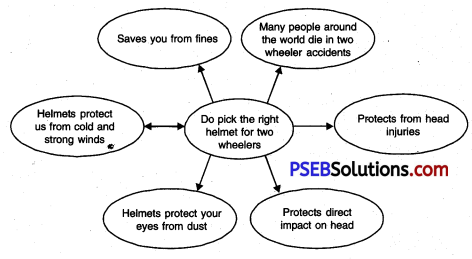
Now tell about the importance of helmets to your partner based on notes you have made : (The teacher must encourage at least 5 pairs to speak in front of the class.)

नोट : विद्यार्थी इन Hints को Sentences में बदलकर एक paragraph में लिखें
Learning to Write
Activity 11.
Picture description.
Describe what you see in the given picture. You can write about.
The vechicles involved in the accident
- What could have happened before the accident ?
- What caused the accident? (Choose One.)
- jumping the red light
- overtaking at the wrong place.
- taking a wrong turn
- applying sudden-brakes by one of the persons involved in the accident
- Whose fault was it ? Why do you say so ?
It is an accident scene at a busy crossing. Two cars collapsed against each other. The accident took place because one car driver crossed the red light. The second car driver
paid for his fault. The car was badly damaged. Thanks god his own life was saved !
Learning to use Language (Groupwork)
Activity 12.
Get into a group of 5 and write a dialogue among five people of a family-mother, father, daughter and son and a cousin who has come to visit your family. :
Scenario : Your family is planning to enjoy the day. Your mother and sister are interested in watching a cricket match at the stadium while your father is fond of cooking and wants to cook a good dinner for the family followed by watching a film on TV. The cousin wants to watch a film in the theatre.
Write a dialogue in which each of you will convince other members of the family that your plan is the best.
Once done, you will also practise speaking the same in your group. (The teacher will randomly select two groups to present the dialogue before the class.)
Answer:
Mother : I would like to watch a cricket match on TV. Dear sister is also interested in it. It is very entertaining. Besides, during these days of Covid-19, it is not wise to go out.

Father : I have a new book on cooking. It has a long list of recipes. I will do cooking for the family tomorrow. You will enjoy spicy and sweet crispy dishes-nons and Amritsari chholey Bhatoorey. In the evening we will watch a classical film on TV. It is a great movie Mughal-i-Aazam.
Cousin : What is all this. I am ready to pass my day at home. I would suggest seeing a film in a theatre. My plan is the best one.
Children : Be serious. It will be a blunder to go out. It is like spreading Corona or getting infected.
Giving and Responding to News:
It is important to understand how to break good or bad news to someone. There are different ways to do so. There are some set expressions that may be used to break the news. Knowing these expressions helps us to become more fluent.
| Giving News |
| Good News |
Bad News |
| I’m really pleased to tell you … |
I’m afraid I’ve got some bad news for you … |
| I’ve got a bit of good news to tell you … |
I’m sorry I’ve got a bit of bad news to tell you … |
| I’ve got some good/brilliant/great/wonderful/splendid news for you … |
I really don’t know how to say it but…. |
| You know what I’ve got a bit of great news for you …. |
I’m sorry to have to say this but … |
| Great news for you … |
I really feel bad to have to say this, but … |

There are also ways and expressions of responding to news.
| Responding to news |
| Good News |
Bad News |
| That’s great !/Great news ! |
I’m awfully sorry that…/I’m sorry to hear that…/I’m sorry to hear such terrible news. |
| How fantastic !/Oh, how wonderful ! |
Please, accept my deepest sympathy/ condolences. |
| What fantastic/good/brilliant/great wonderful/splendid news ! |
I know how you must be feeling. |
| That’s good/brilliant/great/wonderful/splendid news ! |
That must be awful. |
| Congratulations !/Superb ! |
Oh, dear !/Too bad ! |
| That’s wonderful/Fantastic ! |
That’s awful/a pity/unfortunate ! |
| I’m glad to hear that ! |
|
Activity 13:
Use five different expressions to break a piece of a good news and a bad news to your partner who will also respond in five different ways to the good news and the bad news. (Pairwork)
Some ideas for the news you may break :
- Your friend has stood first in the test.
- Rohit Sharma has scored a century.
- India has won the cricket match against
- Your father’s operation has been a success.
- You have a new puppy at home.
- Your friend’s sister is unwell.
- You have failed in the test in spite of working very hard.
- You have lost your wallet/necklace/suitcase.
- Your laptop suddenly stopped responding.
- You have lost your mobile phone.
Answer:
(For Each News) For Good News in the test
- That’s great
- What a good news
- That’s good
- Congratulations
- I’m glad to hear that.
For a piece of Bad News
- Very sad to hear that
- Sorry you must be feeling bad !
- That’s unfortunate
- That must be awful!
- Shocking
Comprehension of Pass
Read the following passages and answer the questions given below each :
(1) Seema is a fifteen year old girl. She loves automobiles and keeps dreaming about driving cars on the road. She reads a lot about cars and their mechanism on the internet. She feels that she knows everything about driving cars. Last year, Seema was just fourteen and she tried to take her mother’s car out on the road to drive without telling her mother. Here, Seema is telling her story of the day she planned this mischief.
1. What does Seema love to do?
सीमा को क्या करना पसंद है ?
2. What big mistake did she commit last year?
उसने पिछले साल क्या बड़ी गलती की ?
3. Choose true and false statements and write them in your answer-book :
(a) Last year seema was just fifteen.
(b) Seema reads a lot about cars on the internet.

4. Complete the following sentences according to the meaning of the passage :
(a) Seema feels that she knows everything …
(b) She reads about cars …………… on the internet…
Or
Match the words with their meaning :
| (i) mischief |
pleasure |
| (ii) planned |
naughtiness |
|
chalked out |
Answer:
1. Seema loves automobiles and keeps dreaming about driving cars on the road.
2. Last year, seema tried to take her mother’s car out on the road to drive, when she was just 14.
3.
(a) False
(b) True.
4.
(a) Seema feels that she knows everything about driving cars.
(b) She reads about cars and their mechanism on the internet.
Or
(1) mischief — naughtiness
(ii) planned — chalked out
(2) I am seema. I am going to tell you a small incident of my life that taught me an important lesson. I love cars. I keep reading about cars on the Internet. After reading so much about cars and driving cars, I felt that I had understood everything about cars and would be able to safely drive on the road. I called my friend Bhavya who is equally interested in driving and also knows how to ride a mobike. I told her that my mother was going to Delhi and her car would be free. Bhavya also got excited and said that she would come to my house.

1. How did Seema feel after reading a lot about cars and driving cars ?
कारों तथा कार चलाने के बारे में बहुत कुछ पढ़ने के बाद सीमा को कैसा महसूस हुआ ?
2. Who is Bhavya ? What is she interested in ?
भावया कौन है ? उसको किस चीज़ में रुचि है ?
3. Choose true and false statements and write them in your answer-book :
(a) Bhavya’s mother was going to the internet.
(b) This incident is related to a lesson giving car driving experience.
4. Complete the following sentences according to the meaning of the passage :
(a) Bhavya also got ……………..
(b) Bhavya knows how to …………….
Or
Write the meanings of the following words in English : (Any two)
incident, excited, understood
Answer:
1. She felt that she had understood everything about cars and she would be able to drive safely on the road.
2. Bhavya is Seema’s friend. Like Seema, she is also interested in driving.
3.
(a) False
(b) True.
4.
(a) Bhavya also got excited.
(b) Bhavya knows how to ride a mobike.
Or
happening, thrilled, came to know.

(3) Bhavya started driving. Since she could ride a mobike and also helped her father many times in taking the car out of the gate, she knew the mechanism and drove with confidence. As we reached the end of the road, I asked her to stop the car. As she was trying to stop the car, two traffic policemen came out from behind the trees. They asked us to come out of the car and asked Bhavya to show them her driving licence. She was only foureen years old and like me she did not have a driving licence. The policemen asked us our names, our age and addresses. They also took our parents’ mobile number and called them. My mother was on her way to Delhi. When she received the phone, she immediately called my father and asked him to meet the police. Bhavya’s father came and the policemen told him that they would impound the car as two minors were sitting in the car and one of them was driving.
1. What happned when Bhavya tried to stop the car ?
जब भावया ने कार को रोकने की कोशिश की तो क्या हुआ ?
2. Who were the two minors sitting in the car ?
कार में बैठे दो नाबालिग कौन थे ?
3. Choose true and false statements and write them in your answer-book :
(a) Seema was driving the car.
(b) Bhavya did not have a driving licence.
4. Complete the following sentences according to the meaning of the passage :
(a) Bhavya knew the mechanism and drove ……..
(b) Seema’s mother asked seema’s father to ………
Or
Match the words with their meaning :
| (i) immediately |
below 18 |
| (ii) minor |
at once |
|
took away |
Answer:
1. Two traffic policemen came out from behind the trees, when Bhavya tried to stop the car.
2. They were Seema and Bhavya.
3.
(a) False
(b) True
4.
(a) Bhavya knew the mechanism and drove with confidence.
(b) Seema’s mother asked Seema’s father to meet the police.
Or
(i) immediately — at once
(ii) minor — below 18

(4) The car was impounded and the police took both of us to the police station for writing the report. They also counselled us on the consequences of what we were planning to do. They said that we could have met with an accident and we might have hurt ourselves badly. They also told us that we could have also injured someone on the road. Then they showed us picturės of some accidents. We both got very scared when we saw the pictures in which a child had died. We looked at each other and decided never to repeat such a blunder. We decided that we will learn how to drive from a driving school when we turn eighteen.
1. What did the police tell the two girls about the consequences of the incident ?
पुलिस ने दोनों लड़कियों को घटना के परिणामों के बारे में क्या बताया ?
2. What did they decide about learning driving?
ड्राइविंग सीखने के बारे में उन्होंने कया फैसला बताया?
3. Choose true the false statements and write them in your answer-book :
(a) We might have met with an accident.
(b) We were free after the car was impounded.
4. Complete the following sentences according to the meaning of the passage :
(a) They decided never to repeat …………
(b) The police took us to the police station for …………….
Or
Write the meanings of the following words in English : (Any two).
blunder, consequences, injured.
Answer:
1. The police told them that they could meet with a serious accident. They could hurt themselves badly. They might hurt someone else also.
2. They decided that they would learn driving from a driving school when they turn 18.
3.
(a) True
(b) False.
4.
(a) They decided never to repeat such a blunder.
(b) The police took us to the police station for writing the report.
Or
big mistake, results, wounded.
Use of words and phrases in Sentences
1. Blunder (a big mistake) -You have committed a blunder.
2. Excited (thrilled) – The players were excited when they scored the last goal.
3. Confidence (belief/trust) – He fights every battle with self confidence.
4. Mischief (misconduct) – Every mischief can’t be forgiven.
5. Received (got) – I received his phone early in the morning.
6. Minor (a person below 18) – A minor is not allowed to drive a car on the road.
7. Injured (wounded) – Ten persons were injured in the road accident.
8. Scared (got afraid) – We got scared to hear the story of her accident.
9. Skill (talent) – We need practice to learn every skill.
10. Cautious (alert) – Be cautious while driving.

Word Meanings
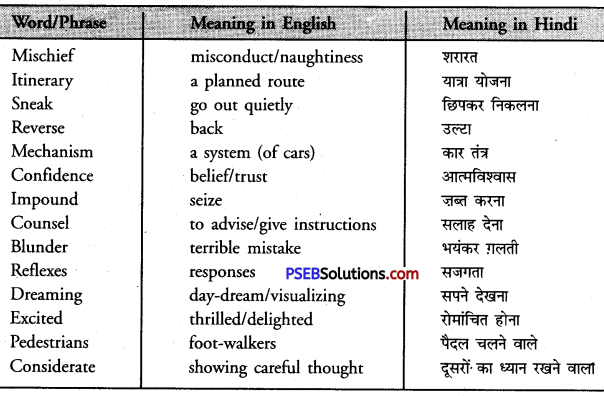
Safety While Driving Summary in Hindi
Seema is a fifteen year ……………come to my house.
सीमा पंद्रह वर्ष की लड़की है। उसे मोटर-गाड़ियों से प्यार है और वह सड़क पर कार चलाने के सपने देखती रहती है। वह कारों के बारे में और उनके कलपुर्जी की बनावट के बारे में इंटरनेट पर पढ़ती रहती है। उसे लगता है कि वह कार चलाने के बारे में सब जानती है। पिछले वर्ष सीमा जब चौदह वर्ष की थी तो उसने माँ को बताए बिना उसकी कार को सड़क पर ले जाने की कोशिश की। यहाँ सीमा अपनी उस दिन की कहानी बता रही है जिस दिन उसने यह शरारत करने की सोची थी। मैं सीमा हूँ। मैं आपको अपने जीवन की एक घटना बताने जा रही हूँ जिससे मुझे जीवन की महत्त्वपूर्ण सीख मिली। मुझे कारें पसंद हैं। मैं कारों के बारे में इंटरनेट पर पढ़ती रहती हूँ। कारों के बारे में तथा कार चलाने के बारे में इतना अधिक पढ़ने के बाद मुझे लगा मुझे कारों के बारे में सब कुछ पता चल चुका है और मैं सड़क पर सुरक्षित गाड़ी चला सकती हूं। मैंने अपनी मित्र भावया (Bhavya) को बुलाया जो कि ड्राइविंग की बराबर की शौकीन है और उसे पता है कि कैसे मोबाइक चलाई जाती है। मैंने उसे बताया कि मेरी मां दिल्ली जा रही है और उसकी कार फ्री है। भावया । भी रोमांचित हो उठी और उसने कहा कि वह मेरे घर आ जाएगी।
The next day …. turn to drive.
अगली सुबह मेरी मां दिल्ली चली गई और मैंने भावया को घर पर बुला लिया। भावया घर आ गई और हम अपने यात्रा कार्यक्रम की योजना बनाने लगे। हमने सैक्टर 17, जो कि एक बड़ा शापिंग कम्पलैक्स है, जाने की योजना बनाई। क्योंकि गाड़ी चलाने का यह मेरा पहला अनुभव था इसलिए मैंने भावया से कार को गैराज से निकालने के लिए कहा। __ हम कार की चाबियाँ लेकर छिपकर घर से बाहर निकल आए। भावया ड्राइवर की सीट पर बैठ गई और कार को पीछे की ओर चलाने लगी। भावया ने बहुत ही आत्मविश्वास से कार को बाहर निकाला। हम दोनों बहुत खुश थे। मैंने उसे सड़क के अंत तक कार को चलाते रहने के लिए कहा और उसके बाद कार चलाने की मैं अपनी बारी लूंगी।

Bhavya started .. …………… was driving.
भावया ने कार चलाना आरम्भ किया। क्योंकि वह मोबाइक चला सकती थी और उसने कार को गैराज से निकालने में अपने पिता की कई बार मदद की थी, उसे कार तंत्र की भी जानकारी थी, उसने बड़े आत्मविश्वास से गाड़ी चलाई। जैसे ही हम सड़क के अंतिम किनारे पर पहुंचे, मैंने उसे कार रोकने के लिए कहा। जैसे ही वह कार रोकने की कोशिश कर रही थी, दो ट्रैफिक पुलिस कर्मचारी पेड़ के पीछे से निकल आए। उन्होंने हमें कार से बाहर आने के लिए कहा और भावया को अपना ड्राइविंग लाइसेंस दिखाने के लिए कहा। वह चौदह वर्ष की थी और मेरी तरह उसके पास भी ड्राइविंग लाइसेंस नहीं था। पुलिस कर्मचारी ने हमारे नाम, आयु तथा पते पूछे। उन्होंने हमारे माता-पिता के मोबाइल नम्बर लेकर उनसे बात की। मेरी माँ दिल्ली के रास्ते में थी। जैसे ही उनके पास फोन पहुंचा उन्होंने तुरंत मेरे पिता जी को पुलिस से मिलने के लिए कहा। भावया के पिता आए और पुलिस कर्मचारी ने उन्हें बताया कि वे कार को इम्पाउंड करेंगे क्योंकि कार में दो नाबालिग बैठी थीं और उनमें से एक चला रही थी।
The car was ……. first when driving.
कार इम्पाउंड (जब्त) कर ली गई और पुलिस रिपोर्ट लिखने के लिए हमें पुलिस स्टेशन ले गई। उन्होंने हमें जो कुछ हम करने जा रहे थे, उनके परिणामों के बारे में सलाह भी दी। उन्होंने हमें बताया कि हमारी दुर्घटना हो सकती थी और हम बुरी तरह से घायल भी हो सकती थीं। उन्होंने हमें बताया कि हम किसी और को भी सड़क पर घायल कर सकते थे। उन्होंने हमें कुछ दुर्घटनाओं के चित्र भी दिखाए। हम दोनों उस समय बहुत डर गए जब हमने चित्रों में एक बच्चे को मरते हुए देखा। हमने एक दूसरे की ओर देखा और निश्चय किया कि ऐसी भयंकर गलती फिर से नहीं करेंगे। हमने निश्चय किया कि जब हम अठारह वर्ष की हो जाएंगी तो ड्राइविंग स्कूल से कार चलाने का प्रशिक्षण लेंगी। यही थी सीमा की कहानी।
कार तंत्रों की जानकारी होने से आप एक अच्छे ड्राइवर नहीं बन जाते। ड्राइविंग एक कौशल है जो कि बहुत अभ्यास से सीखा जाता है। सड़क के नियमों को जानना और ट्रैफिक संकेतों को समझना बहुत आवश्यक है। ट्रैफिक लाइट्स लोगों को दर्शाती हैं कि कब सड़क पार करना सुरक्षित है और कब रुकना। सड़क के नियम और ट्रैफिक संकेत सड़क का प्रयोग करने वालों की सुरक्षा के लिए हैं। सड़क पर निकलने के बाद हम सबको बहुत ही सावधान रहना चाहिए। ड्राइवरों को धैर्यवान, दूसरों का ध्यान रखने वाला और सजग होना चाहिए। पैदल चलने वालों को सहनशील, सावधान और सतर्क होना चाहिए। सदा याद रखें गाड़ी चलाते समय सुरक्षा पहली चीज़ होती है।

Retranslation from english to hindi
1. Seema is a fifteen year old girl. — सीमा पंद्रह वर्ष की लड़की है।
2. She reads a lot about cars. — वह कारों के बारे में पढ़ती रहती है।
3. Seema is telling her story of the day. — सीमा अपनी कहानी बता रही है।
4. I love cars. — मुझे कारें पसंद हैं।
5. I called my friend Bhavya. — मैंने अपनी मित्र भावया को बुलाया।
6. Bhavya also got excited. — भावया भी रोमांचित हो उठी।
7. We planned to go to sector 17. — हमने सेक्टर 17 में जाने की योजना बनाई।
8. We sneaked out of the house with the car keys. — हम कार की चाबियां लेकर छिपकर घर से बाहर आ गए।
9. Bhavya took out the car very confidently. — भावया ने बहुत ही आत्म-विश्वास से कार को बाहर निकाला।
10. I asked her to stop the car. — मैंने उसे कार रोकने के लिए कहा।
11. They asked us to come out of the car. — उन्होंने हमें कार से बाहर आने के लिए कहा।
12. My mother was on her way to Delhi. — मेरी माँ दिल्ली के रास्ते में थी।
13. They showed us pictures of some accidents. — उन्होंने हमें कुछ दुर्घटनाओं के चित्र दिखाए।
14. Driving is a skill. — ड्राइविंग एक कौशल है।
15. We all need to be very careful. — हम सबको बहुत ही सावधान रहना चाहिए।
![]()
![]()
![]()
![]()




